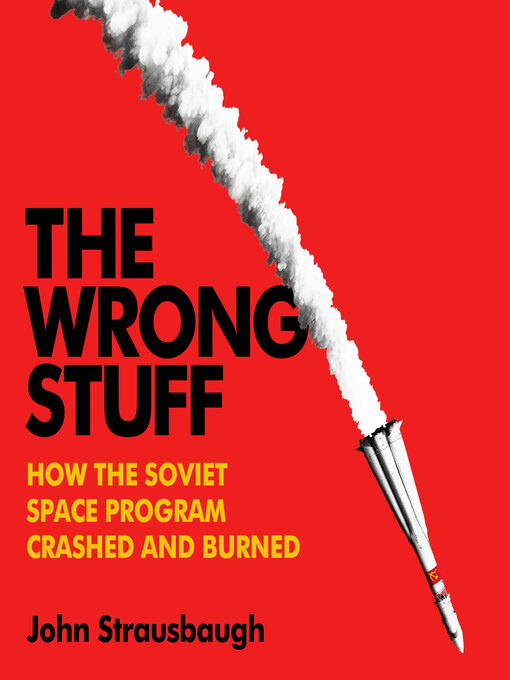The Wrong Stuff
How the Soviet Space Program Crashed and Burned
In the wake of World War II, with America ascendant and the Soviet Union devastated by the conflict, the Space Race should have been over before it started. But the underdog Soviets scored a series of victories—starting with the 1957 launch of Sputnik and continuing in the years following—that seemed to achieve the impossible. It was proof, it seemed, that the USSR had manpower and collective will that went beyond America's material advantages. They had asserted themselves as a world power.
But in The Wrong Stuff, John Strausbaugh tells a different story. These achievements were amazing, yes, but they were also PR victories as much as scientific ones. The world saw a Potemkin spaceport; the internal facts were much sloppier, less impressive, more dysfunctional. The Soviet supply chain was a disaster, and many of its machines barely worked. The cosmonauts aboard its iconic launch of the Vostok 1 rocket had to go on a special diet, and take off their space suits, just to fit inside without causing a failure. Soviet scientists, under intense government pressure, had essentially made their rocket out of spit and band aids, and hurried to hide their work as soon as their worldwide demonstration was complete.
With a witty eye for detail and a gift for storytelling, John Strausbaugh takes us behind the Iron Curtain, and shows just how little there was to find there.
-
Creators
-
Publisher
-
Release date
June 4, 2024 -
Formats
-
OverDrive Listen audiobook
- ISBN: 9781668641613
- File size: 247903 KB
- Duration: 08:36:27
-
-
Languages
- English
-
Reviews
-
Publisher's Weekly
March 18, 2024
This buzzy yet unbalanced account of the Soviet space race from historian Strausbaugh (Victory City) plays on the title of Tom Wolfe’s account of American astronauts, The Right Stuff. Strausbaugh opines that the Soviets—who launched the first man-made satellite, Sputnik, into space in 1957; the first man, Yuri Gagarin, in 1961; and the first woman, Valentina Tereshkova, in 1963—relied on the “wrong stuff.” Drawing from published histories and memoirs (such as Mathew Brzezinski’s Red Moon Rising), he relates a string of near-catastrophes, deadly flukes, and cover-ups. He portrays key players in the Soviet program as hard drinkers with “reckless bravado,” who under unrelenting political pressure sent cosmonauts into orbit with glitchy equipment, and suggests the Soviet government kept its lead in the space race through subterfuge: when the first animal (a dog named Laika) was sent into orbit in 1957, “the Soviets issued false reports was doing fine”; later, when a fire broke out aboard the aging space station Mir, Russian authorities “blandly lied” about how safe the highly flammable oxygen containers were. Though captivating, these anecdotes deserve scrutiny. Strausbaugh relies heavily on secondhand sources and familiar tropes of Russian bravery teetering on madness. He also issues generic criticisms of “a society rotten with corruption and almost guaranteed to underperform,” and underassesses Soviet scientific achievements. Readers earnestly interested in the topic will want to explore elsewhere. -
Booklist
May 1, 2024
If, as Tom Wolfe proclaimed, America's twentieth-century astronauts had the right stuff, Strausbaugh's (The Village, 2014) history reveals that the Soviet cosmonauts had the wrong stuff. The Soviet space program, he argues, was nothing but Nikita Khrushchev's humongous, costly propaganda ploy, in which hapless cosmonauts risked their lives for the regime's glory. Mercilessly, Khrushchev drove his enormously talented team of rocket scientists to beat the Americans to the moon at any cost. As Strausbaugh discovered in archives released after the collapse of the Soviet Union, all of these scientists were driven by fear, clearly understanding the risks they faced but with little choice. Soviet rocketry was made for expedience rather than quality, with few safety measures or escape equipment. Many terrifying close calls ensued, and Soviet rockets rarely got cosmonauts anywhere near their projected landing points. Living on such an edge, it's scarcely surprising that many scientists and cosmonauts were hard drinkers and hard livers. Strausbaugh tells this extraordinary tale in a chatty, familiar voice that adds to the ironies of historical Soviet extraterrestrial adventuring.COPYRIGHT(2024) Booklist, ALL RIGHTS RESERVED.
-
Library Journal
May 1, 2024
Strausbaugh (Victory City) writes about the foibles, successes, and origins of the Soviet Space program after World War II. That's when the Soviet Union, while victorious over the German army, was in disarray after 27 million soldiers were killed during the war. Amid that tumultuous historical period, engineers and politicians developed the Soviet space program. Strausbaugh's book begins with the story of the flight of Voskhod 1 (also known as Sunshine 1), the first spaceflight that carried more than one crewmember into orbit; three men were aboard that spacecraft. The story of that flight and the political implications behind it will give readers a sense of just how much innovation was present in the Soviet Union during that time. Some audiences might be turned off by the caustic and glib tone that sometimes pervades the book, but the power of the material wins out and makes for fascinating reading. VERDICT Recommended for general readers who enjoy books about spaceflight, engineering innovations, and the politics of engineering.--Amy Lewontin
Copyright 2024 Library Journal, LLC Used with permission.
-
Loading
Why is availability limited?
×Availability can change throughout the month based on the library's budget. You can still place a hold on the title, and your hold will be automatically filled as soon as the title is available again.
The Kindle Book format for this title is not supported on:
×Read-along ebook
×The OverDrive Read format of this ebook has professional narration that plays while you read in your browser. Learn more here.



